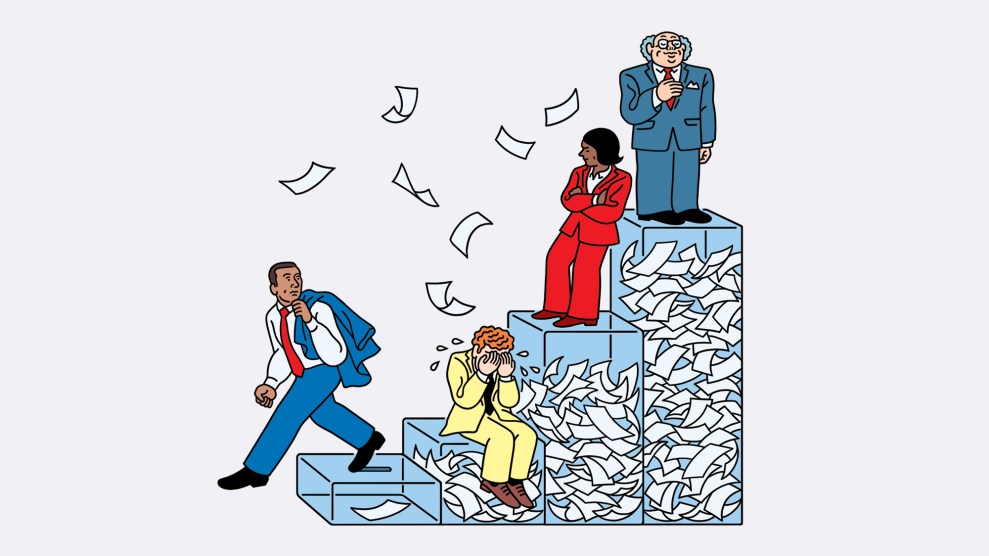Ok, so what was up with Bush pimping the woman who founded Baby Einstein? What was her great moment or heroism or contribution to the country? Maybe Baby Einstein is an OK product or maybe, like some charge, it is a harmful scam, but I just don’t see how it rates the SOTU gallery of heroes treatment. Consider:
“Citing a lack of evidence that screen media is beneficial for babies and growing concern that it may be harmful, the Campaign for a Commercial-Free Childhood (CCFC) filed a complaint today with the Federal Trade Commission (FTC) against Baby Einstein and Brainy Baby, two of the leading producers of videos for infants and toddlers, for false and deceptive advertising. The complaint charges that these companies are violating Section 5 of the Federal Trade Commission Act by marketing their videos as educational for babies. CCFC is asking the FTC to prohibit Baby Einstein and Brainy Baby from making claims about the educational and developmental benefits of their videos and require that advertisements, packaging and websites for all baby videos prominently display the American Academy of Pediatrics’ (AAP) recommendation of no screen time for children under two. “
Rest of press release after the jump. More on the complaints against Baby Einstein here.
May 1, 2006
Contact: Josh Golin (617.278.4172); jgolin@jbcc.harvard.edu
For Immediate Release
CCFC Files FTC Complaint Against Baby Einstein and Brainy Baby;
Parents Deserve Honest Information About Baby Videos
Citing a lack of evidence that screen media is beneficial for babies and growing concern that it may be harmful, the Campaign for a Commercial-Free Childhood (CCFC) filed a complaint today with the Federal Trade Commission (FTC) against Baby Einstein and Brainy Baby, two of the leading producers of videos for infants and toddlers, for false and deceptive advertising. The complaint charges that these companies are violating Section 5 of the Federal Trade Commission Act by marketing their videos as educational for babies. CCFC is asking the FTC to prohibit Baby Einstein and Brainy Baby from making claims about the educational and developmental benefits of their videos and require that advertisements, packaging and websites for all baby videos prominently display the American Academy of Pediatrics’ (AAP) recommendation of no screen time for children under two.
“These companies are exploiting parents’ natural tendency to want what’s best for their children and their deceptive marketing may be putting babies at risk.” said Dr. Alvin F. Poussaint of the Judge Baker Children’s Center and Harvard Medical School. Research suggests that television viewing for babies is negatively associated with cognitive development, regular sleep patterns, and time spent interacting with parents and engaged in creative play.
CCFC’s complaint charges that the videos’ packaging, websites, advertisements, and even the names “Baby Einstein” and “Brainy Baby” are likely to mislead parents into believing that they are beneficial to babies’ development. For instance, on its website, Baby Einstein claims its Baby Wordsworth video – designed for babies as young as one year — “will foster the development of your toddler’s speech and language skills.” Similarly, Brainy Baby’s claims on its website that its “brain stimulating” Peek-A-Boo video “helps nurture such important skills as object permanence, communication skills, cause and effect, language development and many others.”
“The industry, when pressed, acknowledges they have no proof these products do what they say they do,” said pediatrician Dr. Dimitri Christakis, a researcher at Children’s Hospital and Regional Medical Center in Seattle and the senior author of “A Teacher in the Living Room,” a study on educational media for babies, toddlers and preschoolers released in 2005 by the Henry J. Kaiser Family Foundation. “Their unfounded claims undermine the research-based advice that families in my practice deserve.”
“Baby Einstein and Brainy Baby clearly violate the consumer protection laws. The Federal Trade Commission Act prohibits companies from making false claims or claims they cannot substantiate.” said Jennifer Prime of the Institute for Public Representation at Georgetown University Law Center, which is representing CCFC in its complaint.
There are clear signs that the marketing of baby videos is effective. To date, sales of videos for babies for children under two are estimated at more than $1 billion. Last year, Disney’s Baby Einstein alone took in about $200 million. By contrast, only 6% of parents are aware of the AAP’s recommendation of no screen time – regardless of content – for children under two.
“Parents need honest information They have a right to know that baby videos aren’t really educational and may even be detrimental to their babies’ development,” said Dr. Susan Linn, CCFC’s co-founder and author of Consuming Kids. “Just because the marketing and media industries want to lure babies and toddlers to screens doesn’t mean that Baby Einstein and Brainy Baby can mislead parents about the benefits of their products.”
The complete complaint and supporting documentation can be found at http://www.commercialfreechildhood.org/babyvideos/ftccomplaint.htm
The Campaign for a Commercial-Free Childhood is a national coalition of health care professionals, educators, advocacy groups and concerned parents who counter the harmful effects of marketing to children through action, advocacy, education, research, and collaboration among organizations and individuals who care about children. CCFC supports the rights of children to grow up – and the rights of parents to raise them – without being undermined by rampant commercialism. For more information, please visit: www.commercialfreechildhood.org
















